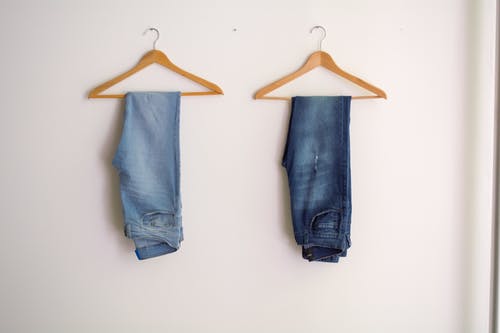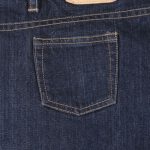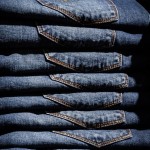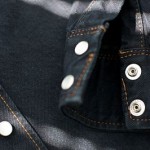Since their origins back in the 1800s, jeans have been made almost exclusively using denim. Whether you’re shopping for a pair of straight-leg jeans or relaxed-fit jeans, you’ll probably discover that they are made of 100% denim. It’s the “go to” material for companies that produce jeans. Unless you’re familiar with denim, though, you might be wondering why it’s used to make jeans.
Overview of Denim: What You Should Know
To better understand why denim is used to make jeans, you must first familiarize yourself with the material itself. Contrary to what some people believe, denim isn’t a specific type of fabric, such as wool. Rather, it’s a form of cotton that’s characterized by a unique design in which the weft goes under multiple warp threads. The end result is a twill weaving pattern consisting of diagonal stitching.
Denim Is Sturdy and Durable
Even though it’s technically cotton, denim is a sturdy and durable material that’s able to withstand significant stress without ripping, tearing or otherwise sustaining damage. When jeans were first invented, they were designed for hardworking men and women in laborious jobs, including gold prospectors who spent countless hours panning and mining for gold. As a result, companies needed to produce jeans using a strong material.
With its twill weaving construction, denim was the perfect material for the job. Companies discovered that denim jeans offered a superior level of strength and durability when compared to conventional textiles. Consumers could wear denim jeans while working in laborious jobs, and unlike with other pants, jeans wouldn’t tear or sustain damage due to their sturdy and durable construction.
Denim Is Soft and Comfortable
Not only is denim is sturdy and durable, it’s also soft and comfortable. There are plenty of other materials that are sturdy and durable, some of which are even stronger than denim. But denim is unique because of its soft texture. It’s still strong and able to withstand countless hours of usage. However, the soft texture of denim offers a balanced construction that’s perfect for jeans.
When wearing denim jeans, you’ll essentially get the best both of worlds. Denim jeans are sturdy and strong, but they are also soft and comfortable. You won’t find this combination of characteristics in other materials, which is one more reason why companies manufacture jeans almost exclusively using denim.
Denim Is Easy to Dye
It’s no secret that jeans are available in a wide variety of colors. In addition to traditional colors like light blue and indigo — the two most common colors in which jeans are made — you’ll find them available in black, white, red, green, yellow and countless other colors.
To produce jeans in a variety of colors, companies must use a material that can easily hold dye. Thankfully, the absorbent properties of denim make it ideal for this purpose. During production, companies dye their jeans by washing them in dye and water. As the dye soaks into the denim, the color of the jeans changes to reflect that of the dye.

Denim Doesn’t Shrink As Much As Other Fabrics
Yet another reason why denim is the preferred material for jeans is because it doesn’t shrink as much as other fabrics. Granted, denim isn’t immune to the shrinking effects of heat. If you wash your jeans in hot water enough times, they will likely shrink to a slightly smaller size. With that said, denim is less susceptible to shrinking than other materials.
You can even take steps to protect your denim jeans from shrinking, such as washing them in cold water rather than hot water. Cold water isn’t as taxing on materials, including denim. Furthermore, it works just as well as warm or hot water.
In addition to washing your jeans in cold water, you can discourage shrinking by hanging them on a clothes hanger. After washing and drying your jeans, immediately transfer them to a clothes hanger. Leaving your jeans bunched up in the clothes dryer will only increase the risk of shrinkage.
Denim Is Easy to Care For
Finally, companies prefer denim over other materials with which to make their jeans because denim is easy to care for. Other materials require special care like dry cleaning. And if you attempt to wash a dry-clean-only garment, it could damage the garment. Thankfully, this isn’t an issue with jeans. Because denim is essentially cotton, you can clean jeans and other denim garments in the washing machine.
Of course, you should still check the care label on your jeans to determine the best way to clean and care for them. Assuming they are made of 100% denim, though, you’ll probably find that it’s safe to wash your jeans in the washing machine. Just remember to follow the advice listed on the care label, which contains caring instructions straight from the manufacturer.
What About Stretch Jeans
There’s an exception to the all-jeans-are-made-denim rule: stretch jeans. Stretch jeans refer to a specific style of jeans that are made of both denim as well as an elastic material like polyester. They usually consist mostly of denim, but companies may add up to 10% of an elastic material to make their jeans more stretchy. When an elastic material is introduced, the jeans become more stretchy, meaning you can pull and bend them without damaging stretch jeans.
Some people enjoy the increased elasticity of stretch jeans. Stretch jeans are slightly softer than regular 100% denim jeans. But the downside to stretch jeans is that they are less durable than all-denim jeans. If you’re worried about your jeans ripping or tearing, you may want to stick with 100% denim jeans instead.
Other than stretch jeans, though, you’ll find most jeans are made entirely of denim. Companies usually prefer denim over other materials because it’s sturdy, soft, easy to dye, resistant to shrinkage and easy to care for. You can see the benefits of denim firsthand by investing in a pair of high-quality jeans sold here at MakeYourOwnJeans.











